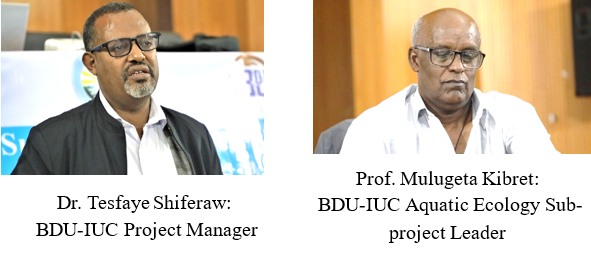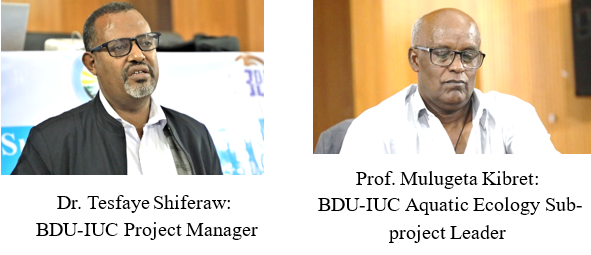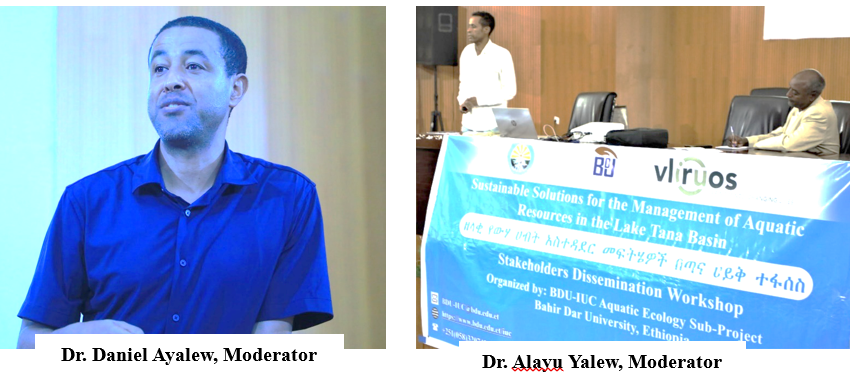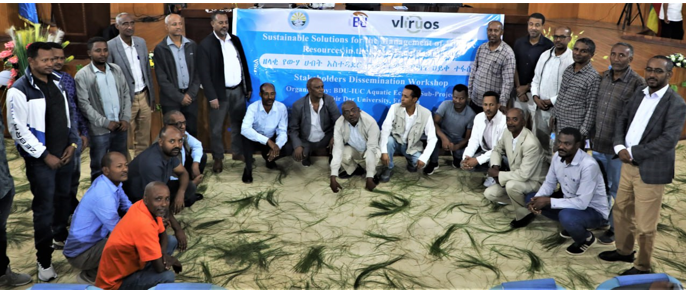
Sustainable Solutions for the Management of Aquatic Resources in the Lake Tana Basin, A stakeholders Dissemination Workshop
Wisdom
05 May, 2025
The BDU-IUC Phase II of the Aquatic Ecology sub-project held a workshop with government officials, NGOs, researchers, and academia to discuss findings from Phase I. The goal was to foster collaboration and support for restoration initiatives from local and regional authorities, particularly environmental agencies, while gathering insights from the scientific community on wetland ecology and monitoring methods.
Dr. Tesfaye Shiferaw, manager of the BDU-IUC Project, provided an overview of the project's goals and progress. He highlighted innovative technologies aimed at benefiting the local community and discussed research on the Lake Tana basin's biodiversity, including wetlands and fish species. Dr. Tesfaye emphasized the project's aim to promote effective water resource management for farmers but noted challenges due to insufficient stakeholder engagement. He called for collaboration and solidarity among stakeholders to protect the biodiversity and fragile wetlands of Lake Tana from potential threats.
On the other hand, Professor Mulugeta Kibret, the leader of the Aquatic Ecology Sub-Project, presented a comprehensive overview of the sub-project’s diverse activities. His insights focused on significant research efforts concerning the wetlands and fish species inhabiting the rich ecosystem of the Lake Tana Basin. Professor Mulugeta reported that the sub-project successfully awarded scholarships to three PhD students and six master's degree candidates during its first phase. This productive phase supported these talented individuals in their academic pursuits and resulted in the publication of six research articles, contributing valuable knowledge to the field. In the current second phase of the project, a similar number of students are actively engaged, continuing the legacy of academic excellence and research innovation.
Dr. Ayalew Wonde presented his research paper, “State of Wetland Degradation and Management in Lake Tana Basin,” highlighting significant wetland degradation due to natural and human activities. He stressed the urgent need for a coordinated response involving all stakeholders and proposed a strategic work division with an accountability system for effective management and restoration.
Dr. Wonde Zelalem also contributed to the Aquatic Ecology Sub-Project with his paper, “Spawning Movement, Breeding, and Nursery Habitat Use of the Migratory Labeobarbus Species of Lake Tana.” He identified 27 fish species in the ecosystem, many threatened by illegal fishing during critical breeding months. Dr. Zelalem called for conservation efforts, including reducing fishing in breeding areas and raising awareness among local fishermen to promote sustainable practices. He also recommended regulations on fishing gear to protect migratory species and secure Lake Tana's aquatic diversity.
During the workshop, Dr. Bayeh Abera, a researcher member in the subproject, delivered a compelling presentation titled “Pesticide Residues in Surface Waters (River, Wetland, Lake) and their Impact on the Districts of the Lake Tana Basin.” In his findings, he highlighted the alarming effects of pesticides and herbicides, revealing their significant threats to groundwater quality, aquatic biodiversity, and human health. He brought to light the unsettling reality that certain pesticides and herbicides, which have been globally banned due to their hazardous nature, are still being utilized in the sub-basin. Moreover, he underscored the urgent need for implementing effective control measures before these harmful substances inflict irreversible damage on both aquatic ecosystems and the well-being of local communities.
In conclusion, after the presentation and thorough discussion, the participants reached a consensus that all stakeholders must actively engage and collaborate, pooling their diverse resources and expertise. This collective effort is crucial for ensuring the healthy and sustainable management of the invaluable water bodies in Lake Tana, along with the tributary rivers that gracefully meander into this magnificent lake and the lush, vibrant wetlands that surround it. This cooperative effort is vital for preserving the ecological balance and promoting the well-being of the communities that depend on these vital water sources. The workshop came to a close with an insightful closing address delivered by Prof. Mulugeta Kibret, the esteemed leader of the sub-project, who emphasized the importance of continued partnership and commitment to this cause.
All photos




